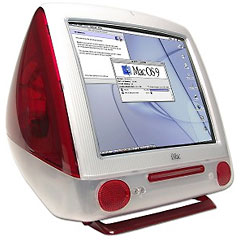Not everyone can afford the latest computer and all the new software that accompanies it. Some teachers have older machines; others have only one or two machines available. Here at Low End Mac we often take the position of recommending refurbishing older machines to get something in the classroom.
 At some point, you may decide it is in your best interests to seek funding to either upgrade or replace your older machines. My goal for this year [first published in 2003] has been to get all student workstations to the G3 level and redeploy the older PowerPC machines in other classrooms.
At some point, you may decide it is in your best interests to seek funding to either upgrade or replace your older machines. My goal for this year [first published in 2003] has been to get all student workstations to the G3 level and redeploy the older PowerPC machines in other classrooms.
 When you decide to pursue funding to upgrade or expand the computers in your classroom, odds are you’ll be writing a grant. I’ve written and received several grants for varying amounts. I’ve been rejected for more, so I will be giving you advice from both sides of the fence.
When you decide to pursue funding to upgrade or expand the computers in your classroom, odds are you’ll be writing a grant. I’ve written and received several grants for varying amounts. I’ve been rejected for more, so I will be giving you advice from both sides of the fence.
This series of articles will address several aspects of grant writing and funding, with the purpose of obtaining either computer equipment or science equipment.
Set Your Priorities
If your objective is to “get some money” or even “use the Internet in the classroom,” you’re just like another 10,000 schmucks out there who want money. Everyone wants money to buy computers and other technology.
The issue is what you plan to do with it that you couldn’t do before.
You need to develop a specific educational purpose. Maybe computers are the best tool to solve your problem; maybe not. If you don’t know why you need computers, then perhaps you don’t need computers in the first place.
For example, if you wish to have students write reports, you need to be able to articulate what you can do beyond simply writing things by hand. For a very simple example, you might say that you can teach advanced editing and outlining skills with computers that are not possible to reproduce easily with handwritten materials.
You should also avoid requesting grants to help student do generic “research.” Research is a pretty broad term. Most of us in physical science consider research to be the activity you do when you produce original source material through measurement and observation of the natural world. In other subjects you may be compiling and analyzing material written by others such as a compilation of opinion pieces on the Vietnam war. That could be done in a library as well as on a computer, and with more reliable sources to boot.
However, if your objective is to enable students to generate questions with which to “chat” with a group of veterans located in another state – beyond the reach of a field trip – then you have a task that can be done better with a computer than with other means. Educationally you’ll have the students interacting with primary sources instead of reading someone’s account of someone else’s story. If the author of the book never thought to ask question X, then the student reading the book never finds out the answer to question X.
Odds are the author of a book is going to anticipate almost everything students might ask. In classic research, you just try another book if the first one doesn’t cut the mustard. However, if students never get the chance to interact with primary sources, then it may never occur to them to ask certain questions.
This needs to be more than whitewashing your desire for hardware with a superfluous project as an excuse to get the hardware. That approach has your priorities reversed, and grant readers will know it.
What you need is an unfulfilled purpose for which computers are the best solution. That means you’re going to be designing lessons and eventually carrying through on the commitment you make when you request the funding.
If there is a desirable side effect of equipping your classroom for other projects (even those not conceived yet), that’s fine. That must remain secondary to the educational need of promoting student learning, meeting standards, or giving your students a broader experience than they could get before.
If you’re sincere in this, then the project is supplemented by the grant instead of dependent on it. Our school recently was awarded a substantial grant to establish a space academy – next year we will have five different space-related courses in the curriculum, probably something like a record in high schools. The grant is state funded.
If the funding evaporates in the next budget cycle, we’re going ahead with the project. We have backup plans andcontingency funding to keep the ball rolling. The project is larger than the grant.
Grant readers want to join a winning team, and something with past history and momentum is more of a sure bet than something that totally depends on grant funding to exist.
Finding a Source of Funding
It’s not my intention to do your homework for you. A simple search for “education grants” on any search engine will turn up hundreds of links. If you insist, you might start by clicking on links located at <http://dir.yahoo.com/Education/financial_aid/grants/>. Many of these are link lists that lead to many other grants not directly listed.
However, I will point out one thing: If you can go local, your odds are better. National grants are very competitive, and anything associated with the government will have orders of magnitude more paperwork.
- Local: See if your district has an education foundation or if a local business sponsors education grants. Many companies will fund projects directly, even if they don’t sponsor a formal grant program. Others will donate in-kind services. We are getting several thousand dollars in engineering reports from SBC (a telephone company) for no charge for one project.
- Regional: Keep an eye out for grant notices in union newsletters, district newsletters, and state content agencies like regional NSTA (National Science Teacher Association) chapters (and their equivalent in other countries). Larger districts may have a grants specialist employed full time to help people like you. Ask around. One side effect of asking around is that people send you things because they know you’re looking for funds.
- National: National grants are (it bears repeating) hard to get, very competitive, and usually carry a high paperwork burden. They also have the biggest potential payoff. You almost certainly will need to have some sort of a partner, such as a university professor, a business, or some other grantees to associate with for your work. One of the easiest way to get limited funding is to join one of the many summer workshops held on a variety of topics every year. Often these workshops will provide you with transportation and a stipend which can be equivalent to a sizable grant in and of itself. It was such a summer program that provided me with an all-expenses paid Masters degree . . . if that’s not a grant, I don’t know what is. (Before you write me about it, note the program I was in ran once, over ten years ago, and hasn’t been repeated. Doesn’t mean someone else won’t do it, though.)
Next time I’ll discuss writing the application, lining up support from stakeholders, and how to make your application stand out above the crowd.
Keywords: #grantwriting #maclabreport
Short link: http://goo.gl/K4iKW5
searchword: writeagrant


